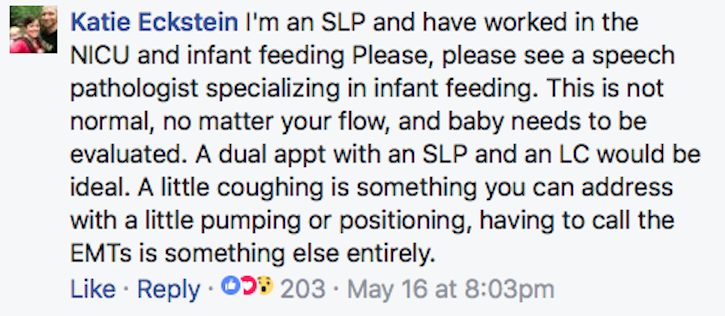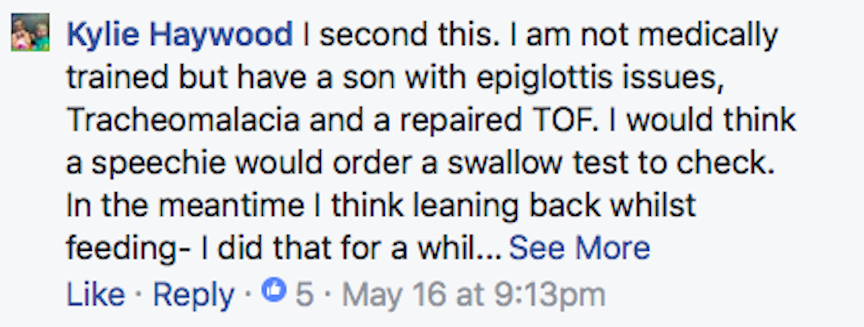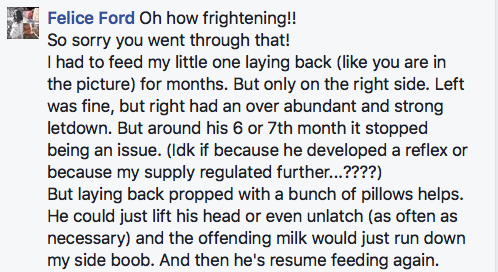Clearly shaken by the ordeal, the mom took to Breastfeed Mama Talk Facebook page to share her story to make others aware of this potential issue. She wrote: More from CafeMom: 13 Genius Breastfeeding Hacks to Make Life as a Nursing Mom So Much Easier This had to be terrifying for the mama, so naturally she asked for the advice of fellow parents: Because this seems like such a extreme situation, we asked Mika Hiramatsu, MD, a pediatrician at Castro Valley Pediatrics in Hayward, California, to share her insight. I breastfed my daughter for 18 months & nothing like his ever happened to us. I suppose my question is what can I do about this? Any experience? Any other moms had this happen to them. I’m talking like limp, in an ambulance oxygen masks, & sirens type of drama, all from us doing what we’re both supposed to be doing. I was told by a lactation consultant that I have a strong let down & maybe an over supply & maybe I should be feeding him laying down or to push down in my breast to stop the flow but I really didn’t understand. “It’s not uncommon for a mom to have a brisk letdown of breast milk where a lot of milk can come out at once,” she said. “However, it’s quite rare for a baby in this situation to have to be taken to hospital by ambulance. Typically, a normal baby who is startled by a sudden gush of milk will cough and sputter and then quickly recover, provided that the mother recognizes the event and stops feeding.” Dr. Dyan Hes, medical director of Gramercy Pediatrics, agreed. “Babies often choke while feeding but most of them can be patted on the back firmly and recover without incident,” she said. “This happens with both bottle-fed babies and breastfed infants. Sometimes they drink too fast and they choke.” She added, “In this case, the mother had a very strong flow of breast milk … Some women have faster flow from one breast, and in this case I always recommend that they start the feed with the slower breast when the baby is more hungry. Sometimes the combination of a ravenous baby and fast flow can lead to gagging and choking.” Several who read the post also offered their advice, which included seeking an evaluation from a speech language pathologist, preferably one who specializes in infant feeding: Facebook Facebook More from CafeMom: 9 Gorgeous Photos of Moms Breastfeeding Beyond 12 Months From ‘The Honest Body Project’ Other moms who’ve faced similar issues offered their advice and empathy: Facebook
Facebook If no medical conditions are found, Dr. Hiramatsu says choking on breast milk is usually not a serious issue. “It can be helpful to bring the baby upright or slightly facing forward and pat the back,” she said. “This is not generally a life-threatening event.” Dr. Hes also had a few recommendations for other moms with a rapid flow. “Mothers with a fast flow can also sit more upright and prop the baby’s head up instead of being below the breast,” she advised. “There are many nursing pillows on the market to help elevate the head of the baby while nursing. Moms can also give their babies a break while feeding. If babies drink quickly they sometimes need to burp during the feed and then go back on the breast. This helps prevent choking as well. Mothers with a fast flow can also learn to pace the feeds with frequent breaks.” More from CafeMom: 9 Gorgeous Photos of Moms Breastfeeding Beyond 12 Months From ‘The Honest Body Project’ She noted that moms should also be armed with as much life-saving information as possible. “Clearly this is frightening for any mother,” she said. “This is why all mothers are shown a CPR video prior to discharge from the hospital in the United States. We recommend to all our new parents to take a CPR course. In this case, her baby turned blue so she did the right thing and called 911, but if parents are shown proper technique they could initiate CPR while the ambulance is on the way.” We’re glad everything turned out okay for this little guy and we’re glad this mom shared her experience, as it’s definitely one you don’t hear talked about too often.






title: “Baby Chokes On Breast Milk Ends Up In The Er” ShowToc: true date: “2024-09-08” author: “Therese Torres”
Clearly shaken by the ordeal, the mom took to Breastfeed Mama Talk Facebook page to share her story to make others aware of this potential issue. She wrote: More from CafeMom: 13 Genius Breastfeeding Hacks to Make Life as a Nursing Mom So Much Easier This had to be terrifying for the mama, so naturally she asked for the advice of fellow parents: Because this seems like such a extreme situation, we asked Mika Hiramatsu, MD, a pediatrician at Castro Valley Pediatrics in Hayward, California, to share her insight. I breastfed my daughter for 18 months & nothing like his ever happened to us. I suppose my question is what can I do about this? Any experience? Any other moms had this happen to them. I’m talking like limp, in an ambulance oxygen masks, & sirens type of drama, all from us doing what we’re both supposed to be doing. I was told by a lactation consultant that I have a strong let down & maybe an over supply & maybe I should be feeding him laying down or to push down in my breast to stop the flow but I really didn’t understand. “It’s not uncommon for a mom to have a brisk letdown of breast milk where a lot of milk can come out at once,” she said. “However, it’s quite rare for a baby in this situation to have to be taken to hospital by ambulance. Typically, a normal baby who is startled by a sudden gush of milk will cough and sputter and then quickly recover, provided that the mother recognizes the event and stops feeding.” Dr. Dyan Hes, medical director of Gramercy Pediatrics, agreed. “Babies often choke while feeding but most of them can be patted on the back firmly and recover without incident,” she said. “This happens with both bottle-fed babies and breastfed infants. Sometimes they drink too fast and they choke.” She added, “In this case, the mother had a very strong flow of breast milk … Some women have faster flow from one breast, and in this case I always recommend that they start the feed with the slower breast when the baby is more hungry. Sometimes the combination of a ravenous baby and fast flow can lead to gagging and choking.” Several who read the post also offered their advice, which included seeking an evaluation from a speech language pathologist, preferably one who specializes in infant feeding: Facebook Facebook More from CafeMom: 9 Gorgeous Photos of Moms Breastfeeding Beyond 12 Months From ‘The Honest Body Project’ Other moms who’ve faced similar issues offered their advice and empathy: Facebook
Facebook If no medical conditions are found, Dr. Hiramatsu says choking on breast milk is usually not a serious issue. “It can be helpful to bring the baby upright or slightly facing forward and pat the back,” she said. “This is not generally a life-threatening event.” Dr. Hes also had a few recommendations for other moms with a rapid flow. “Mothers with a fast flow can also sit more upright and prop the baby’s head up instead of being below the breast,” she advised. “There are many nursing pillows on the market to help elevate the head of the baby while nursing. Moms can also give their babies a break while feeding. If babies drink quickly they sometimes need to burp during the feed and then go back on the breast. This helps prevent choking as well. Mothers with a fast flow can also learn to pace the feeds with frequent breaks.” More from CafeMom: 9 Gorgeous Photos of Moms Breastfeeding Beyond 12 Months From ‘The Honest Body Project’ She noted that moms should also be armed with as much life-saving information as possible. “Clearly this is frightening for any mother,” she said. “This is why all mothers are shown a CPR video prior to discharge from the hospital in the United States. We recommend to all our new parents to take a CPR course. In this case, her baby turned blue so she did the right thing and called 911, but if parents are shown proper technique they could initiate CPR while the ambulance is on the way.” We’re glad everything turned out okay for this little guy and we’re glad this mom shared her experience, as it’s definitely one you don’t hear talked about too often.






title: “Baby Chokes On Breast Milk Ends Up In The Er” ShowToc: true date: “2024-09-02” author: “Raymond Choe”
Clearly shaken by the ordeal, the mom took to Breastfeed Mama Talk Facebook page to share her story to make others aware of this potential issue. She wrote: More from CafeMom: 13 Genius Breastfeeding Hacks to Make Life as a Nursing Mom So Much Easier This had to be terrifying for the mama, so naturally she asked for the advice of fellow parents: Because this seems like such a extreme situation, we asked Mika Hiramatsu, MD, a pediatrician at Castro Valley Pediatrics in Hayward, California, to share her insight. I breastfed my daughter for 18 months & nothing like his ever happened to us. I suppose my question is what can I do about this? Any experience? Any other moms had this happen to them. I’m talking like limp, in an ambulance oxygen masks, & sirens type of drama, all from us doing what we’re both supposed to be doing. I was told by a lactation consultant that I have a strong let down & maybe an over supply & maybe I should be feeding him laying down or to push down in my breast to stop the flow but I really didn’t understand. “It’s not uncommon for a mom to have a brisk letdown of breast milk where a lot of milk can come out at once,” she said. “However, it’s quite rare for a baby in this situation to have to be taken to hospital by ambulance. Typically, a normal baby who is startled by a sudden gush of milk will cough and sputter and then quickly recover, provided that the mother recognizes the event and stops feeding.” Dr. Dyan Hes, medical director of Gramercy Pediatrics, agreed. “Babies often choke while feeding but most of them can be patted on the back firmly and recover without incident,” she said. “This happens with both bottle-fed babies and breastfed infants. Sometimes they drink too fast and they choke.” She added, “In this case, the mother had a very strong flow of breast milk … Some women have faster flow from one breast, and in this case I always recommend that they start the feed with the slower breast when the baby is more hungry. Sometimes the combination of a ravenous baby and fast flow can lead to gagging and choking.” Several who read the post also offered their advice, which included seeking an evaluation from a speech language pathologist, preferably one who specializes in infant feeding: Facebook Facebook More from CafeMom: 9 Gorgeous Photos of Moms Breastfeeding Beyond 12 Months From ‘The Honest Body Project’ Other moms who’ve faced similar issues offered their advice and empathy: Facebook
Facebook If no medical conditions are found, Dr. Hiramatsu says choking on breast milk is usually not a serious issue. “It can be helpful to bring the baby upright or slightly facing forward and pat the back,” she said. “This is not generally a life-threatening event.” Dr. Hes also had a few recommendations for other moms with a rapid flow. “Mothers with a fast flow can also sit more upright and prop the baby’s head up instead of being below the breast,” she advised. “There are many nursing pillows on the market to help elevate the head of the baby while nursing. Moms can also give their babies a break while feeding. If babies drink quickly they sometimes need to burp during the feed and then go back on the breast. This helps prevent choking as well. Mothers with a fast flow can also learn to pace the feeds with frequent breaks.” More from CafeMom: 9 Gorgeous Photos of Moms Breastfeeding Beyond 12 Months From ‘The Honest Body Project’ She noted that moms should also be armed with as much life-saving information as possible. “Clearly this is frightening for any mother,” she said. “This is why all mothers are shown a CPR video prior to discharge from the hospital in the United States. We recommend to all our new parents to take a CPR course. In this case, her baby turned blue so she did the right thing and called 911, but if parents are shown proper technique they could initiate CPR while the ambulance is on the way.” We’re glad everything turned out okay for this little guy and we’re glad this mom shared her experience, as it’s definitely one you don’t hear talked about too often.





